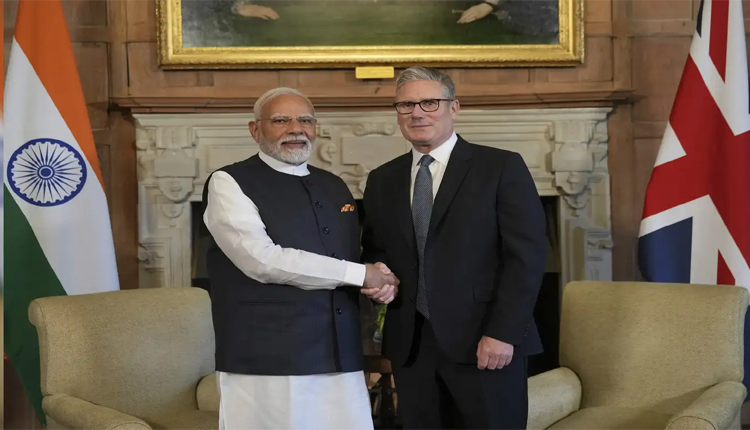New Delhi: India and the United Kingdom have signed a landmark Free Trade Agreement (FTA) during Prime Minister Narendra Modi’s visit to the UK, marking the culmination of three years of negotiations. The deal is expected to increase bilateral trade by approximately $34 billion annually, benefiting multiple sectors in both countries.
Named the Comprehensive Economic and Trade Agreement (CETA), this FTA will eliminate or significantly reduce tariffs on a wide range of goods, making Indian exports to the UK more competitive and British products more affordable in India.
Agriculture and Processed Foods
Over 95% of Indian agricultural and processed food products, including fruits, vegetables, spices like turmeric, black pepper, and cardamom, and ready-to-eat items such as mango pulp and pickles, will now enter the UK duty-free. This is expected to boost India’s agricultural exports by 20% in the next three years, potentially reaching $100 billion by 2030. Certification processes will be simplified, saving time and costs. New crops like jackfruit, millet, and organic herbs will also find access to UK markets, benefiting farmers. However, India has not offered concessions on dairy, apples, oats, and oils.
Marine Products
Tariffs of 4.2% to 8.5% on Indian marine exports such as shrimp, tuna, and fishmeal will be removed. This will help Indian fishermen gain better prices and increase exports, expanding India’s current 2.25% share in the UK’s $5.4 billion marine market.
Coffee, Tea, and Spices
The UK already imports Indian coffee (1.7%), tea (5.6%), and spices (2.9%). Duty-free access will further boost exports, especially instant coffee, helping India compete with major European suppliers.
Oilseeds and Textiles
Reduced taxes and streamlined procedures will increase oilseed exports. Indian textiles will benefit from zero duties on 1,143 product categories, leveling the playing field with competitors like Bangladesh and Pakistan. Ready-made garments, home textiles, carpets, and handicrafts are expected to see a rise in exports, potentially increasing India’s UK market share to 5% within 1-2 years.
Engineering Goods and Electronics
Duties up to 18% on electric machinery, auto parts, and industrial equipment have been eliminated. Engineering exports could double to $7.5 billion in five years. Electronics like smartphones, optical fibres, and inverters will also enjoy duty-free access. The software and IT services sector anticipates 15-20% annual growth.
Pharmaceuticals and Medical Devices
India’s generic medicines will become more affordable in the UK, boosting exports. Surgical instruments, X-ray machines, and ECG devices will enter duty-free.
Chemicals, Plastics, Sports Goods, and Jewelry
Chemical exports may grow by 30-40%, while plastics like pipes and kitchenware will see 15% growth due to tariff removal. Sports goods, including footballs, cricket equipment, and toys, will benefit, giving India an edge over China and Vietnam. Jewellery exports, currently $941 million, could double in 2-3 years.
Leather and Footwear
A 16% duty on leather and footwear has been removed, making Indian products more competitive in the UK market. Key manufacturing hubs like Agra, Kanpur, Kolhapur, and Chennai stand to gain.
Service Sector and Innovation
Indian professionals such as project experts, yoga trainers, chefs, and musicians will find it easier to work in the UK. The agreement promotes innovation by allowing Indian professionals to work in 35 sectors in the UK for up to two years without establishing an office, benefiting over 60,000 IT professionals annually.
Benefits for Indian Consumers
India has cut tariffs on nearly 90% of British imports. For example, import duty on Scotch whisky will reduce from 150% to 75%, eventually reaching 40% over ten years. Electric vehicles will see a drop from 110% to 10% duty within a quota. Cosmetics, chocolates, biscuits, lamb, salmon, soft drinks, and medical devices will become more affordable. Overall, average duties on UK goods will fall from 15% to 3%, giving Indian consumers access to premium British brands at lower prices.
This FTA is expected to open new avenues for farmers, fishermen, small businesses, startups, professionals, and large industries, strengthening economic ties and accelerating growth between India and the UK.
The India-UK Free Trade Agreement marks a significant milestone in bilateral relations, promising substantial trade growth and mutual benefits. As the deal comes into force, both nations are poised to witness enhanced market access, increased investments, and deeper cooperation across sectors. Stakeholders will closely monitor implementation to ensure the full potential of this historic pact is realised.



Comments are closed.